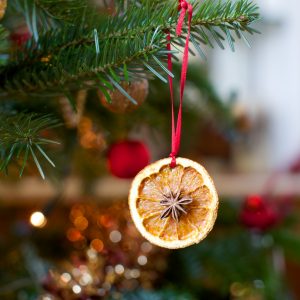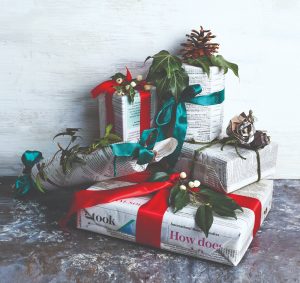Environment
Easy eco-friendly swaps for a sustainable Christmas
Looking to have a more sustainable Christmas this year? With an estimated 114,000 tonnes of plastic packaging thrown away each Christmas, the festive season can have a significant impact on the environment. While it’s rightly a time for indulgence, our celebrations don’t need to cost the earth!
From choosing reusable crackers to renting your festive outfits, there are plenty of easy ways to make your Christmas Day sustainable. We’ve put together our top tips for ensuring your festivities are as eco-friendly as possible.
How to have a sustainable Christmas
Choose your tree wisely
A Christmas tree is a key feature in most British households. While many of us are wise to the potential environmental issues surrounding this festive staple, we often disagree about what makes the most sustainable tree.
Although reusable trees are sometimes touted as the greenest option, this often isn’t the case. It’s estimated that you’d need to reuse your tree for 20 years to make it better than a real-life fir!
If you’re on the hunt for a tree, we’d recommend a real one, ideally from a local farm. Or, even better, use a potted living Christmas tree that you can rent (or keep in your garden again for next year).
Deck the halls sustainably
 Decorating the house ahead of Christmas is a much-loved festive activity. Who doesn’t love turning on the tunes and getting started on the tree? A few small tweaks to decorations will easily green up your celebrations.
Decorating the house ahead of Christmas is a much-loved festive activity. Who doesn’t love turning on the tunes and getting started on the tree? A few small tweaks to decorations will easily green up your celebrations.
Using LED lights instead of incandescent ones can reduce energy usage by up to 80%. Although they’re more expensive, they won’t add nearly as much to your energy bill, so they’ll end up paying themselves off.
In terms of baubles, the most sustainable option is using what you’ve already got. However, making your own decorations can give your tree a new lease of life.
If you do want to buy new decorations, choose ones crafted from natural materials such as wood or glass. We love these silver and gold starfish decorations designed by Geronimo Jones for Liz’s charity LiveTwice. They’re a luxurious decoration that gives back.
Give plantable Christmas cards
Christmas cards are a lovely way to let people know we’re thinking of them. Fortunately, there are eco-friendly versions that we can share with loved ones.
We love the recyclable cards from Wildflower Favours. This eco-friendly brand is committed to saving the bees. Each card comes with a packet of British wildflower seeds, grown without pesticides.
Treat yourself to organic wine
For many, getting a little jolly is one of the joys of the festive period. Opting for an organic wine is a fantastic way to treat yourself and the environment this Christmas.
Organic viticulture and farming has a wealth of benefits for the planet. Many mainstream winemakers use chemical pesticides or fertilisers, which can ruin the PH balance of the soil, impact biodiversity and infiltrate nearby waterways. Organic winemakers avoid these substances, meaning their practices can actually increase soil microbe levels, encouraging flora and fauna to flourish. They’re also less impactful on soil and more carbon efficient.
Plus, organic wines tend to use fewer additives like sulphites. Rumour has it that it even leaves you with less of a hangover, so it’s really a win-win for everyone.
Get creative sourcing your festive outfit
Christmas is definitely a time for dressing up. That said, you don’t need a new wardrobe to look fabulous! There are plenty of sustainable ways to source your Christmas Day look, from digging out old favourites to renting an outfit.
Wearing what you already own is the greenest option. Heading out for Christmas? You can easily spice up your look by raiding someone else’s wardrobe. Organising an outfit swap will give you some pre-Christmas fun, and new looks for everyone!
Alternatively, renting a dress – rather than buying – can be cost effective and more sustainable. Platforms like Hurr Collective have an extensive range of items, designer included, that can be rented for as little as two days. Girlmeetsdress and Hirestreet have great options too.
Make smart food choices
Food is an important part of Christmas Day, and key to making your celebrations more sustainable.
Buying food locally will help reduce your carbon footprint, while also showing independent suppliers some love. The average spend on food per person at Christmas is around £160. It would be great to see some of that going back into our communities!
Reducing food waste is also a must. Food waste increases at this time of year, with roughly seven million tonnes wasted each Christmas. This includes around 848 tonnes of scrapped roast potatoes!
Instead of chucking them, add them to an omelette, refry them with garlic, or serve them in a warming soup. Properly stored, roast potatoes last three to five days in the fridge. This provides plenty of opportunity to try out new recipes.
It’s also a great idea to make a list ahead of any Christmas food shopping. Festive offers at the supermarket can be tempting, so making a list will help you avoid buying excess items.
Go for greener wrapping options
 Switching up your wrapping paper is a great way to have a more positive impact this Christmas. A scary 88 square km is used each year, and much of this ends up in the landfill.
Switching up your wrapping paper is a great way to have a more positive impact this Christmas. A scary 88 square km is used each year, and much of this ends up in the landfill.
That’s because lots of wrapping paper is made with Mylar, a plastic film coated with aluminium, or glitter, which is a microplastic.
To be safe, we’d recommend avoiding anything shiny, metallic or glittery. It’s also a good idea to check with your local authorities to see what they can and can’t recycle.
That doesn’t mean wrapping paper needs to be boring though. We love this great selection of Coloured Recycled Kraft Paper from Naturally Wrapt, which features loads of gorgeous shades. Finish with a linen ribbon for a chic and environmentally-friendly gift.
Avoid individually-wrapped chocolates
Everyone loves to indulge with a chocolate box at Christmas. Unfortunately, many festive favourites come heavily packaged in plastic. This is two-fold: the boxes themselves and the individual confectionary wrappers inside. However, it’s the wrappers that pose the main issue.
While the storage tins are usually made from recyclable PET, a lot of wrappings contain polystyrene or polypropylene, which are non-recyclable. So, although individually-wrapped options are great for sharing, they’re not so good for the environment.
We love Cocoa Loco’s organic, fair-trade options as a plastic-free alternative. All chocolates are palm-oil free and handmade in their West Sussex Chocolate Barn, and the brand avoids using plastic in its packaging.
Think you’ll miss your usual? Go for Quality Street’s festive tin. The coloured wrappers are compostable, while the foil ones can be recycled in the same way as cans.
Discover more festive ideas in A Happy, Healthy Christmas
 Step inside Liz’s 75-page guide and enjoy 40 tempting festive recipes, with everything you need for your ultimate Christmas countdown. From festive foods and feasts, gut-friendly party fare and Boxing Day treats, enjoy Christmas with a wellbeing twist.
Step inside Liz’s 75-page guide and enjoy 40 tempting festive recipes, with everything you need for your ultimate Christmas countdown. From festive foods and feasts, gut-friendly party fare and Boxing Day treats, enjoy Christmas with a wellbeing twist.
Liz explains how to make holiday decorations and homemade gifts for the ultimate personal touch. Plus discover the best drinks to serve family and friends – from mulled wine to mocktails, kombucha cocktails and more. It’s your go-to guide for surviving the season stress-free!
Download A Happy, Healthy Christmas
Read more articles like this
Words: Tilly Alexander
Easy eco-friendly ways to protect the ocean
Advertisement




